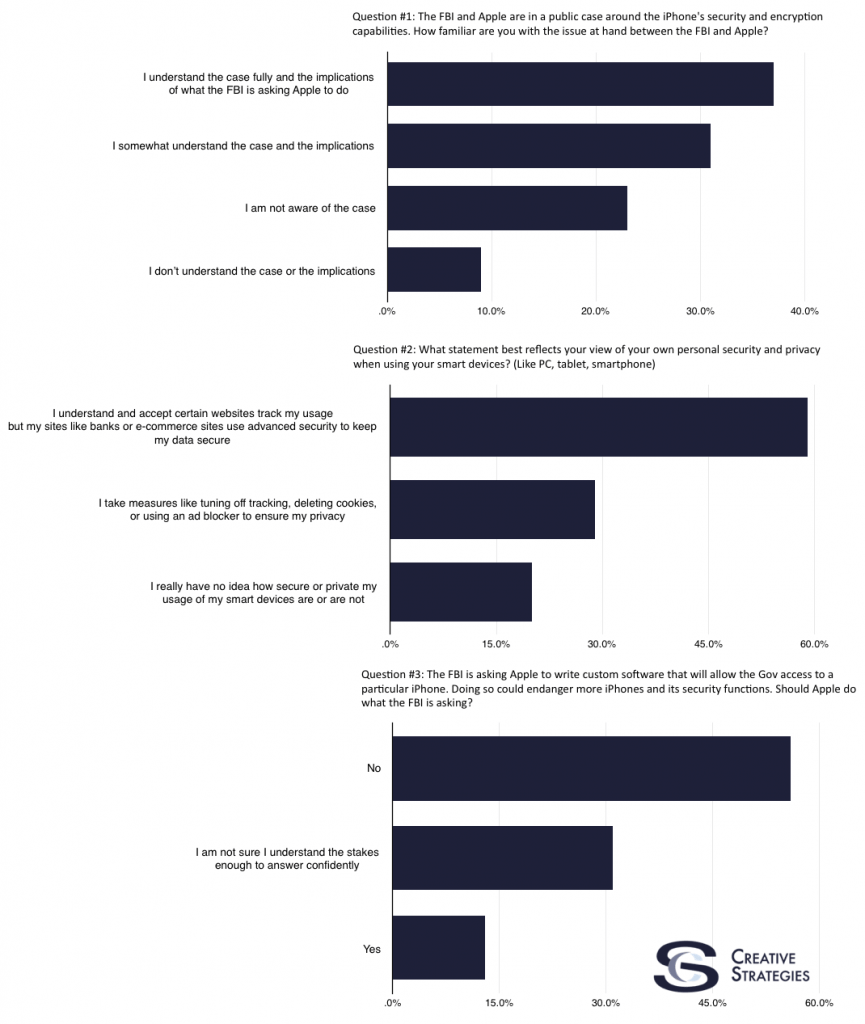Over the past few weeks, many companies have been running consumer polls to see if the public is behind the Apple or the FBI. Given the fact we know consumer education on this matter is extremely weak, doing a poll on this subject is difficult to get right. Philip Elmer-DeWitt did a roundup just to show the range of sentiment and, more importantly, all the different ways people are asking the question. It is how the question has been asked I have a problem with.
If you were to walk up to a stranger on the street and say something to the effect of “The FBI is asking Apple to unlock the iPhone used in the San Bernardino terrorist attacks. Should they cooperate?” Asked that way, very few people would say no, Apple should not cooperate. Yet this kind of leading question is very common in consumer research polls and is entirely disingenuous.
This kind of research is hard. While I’m not sure I’ve even framed the question right, I still sought to do my own poll in our consumer panel. But I did so with some pre-questions to see what consumers are willing to admit about their own knowledge of this issue. Below is the result of three questions I polled consumers with regarding this case. Click to enlarge the images.
I set out to not just see if consumers are backing Apple or the FBI but their overall understanding of the case and security/privacy matters at large. As you can see, awareness of the case and consumers’ own admission of their understanding was varied. There was no dominant sentiment that the majority of respondents understood or even somewhat understood the case.
The next question was an attempt to get an awareness of some common elements of online security and privacy. With 51% of respondents having an understanding of the types of sites that track them and those which they believe are more secure, it gave me confidence we had a consumer base that understood some of the realities of online security and privacy.
Then, without leading survey respondents, I wanted to state the main points of the case which are true without using words like “terrorist” or “hacking”. It was an attempt to get an answer yet state some of the fundamental points, as if I was explaining it to a friend or family member to make sure they understood the basics before giving their opinion. While the majority backed Apple, I made sure to give consumers an out in case they didn’t feel confident answering one way or the other. With just over 30% saying they did not understand the case enough, I feel we captured at large the kind of sentiment around this issue with the mainstream consumer.
The public may not always know what is best for them but, in this case, I think we conclude the public understands we should not give any government the potential to become Big Brother.


Yes, the slippery slope of crafting a poll to yield the truth. All too often polls answer more about the panel than about the question at hand.
It doesn’t matter what a poll says. This is about what the law says.
We don’t (yet) have Emperor Trump deciding for us…
Well, it does matter what polls say because after the courts get done sorting out the legal issues, the legislature can alter or reverse that decision.
Under the Constitution, sure. How many poll takers would frequently and blatantly support unconstitutional positions?
Legislation that is within constitutional limitations can dramatically alter current encryption and security laws and public opinion has a powerful effect on legislators.
Agreed, but they are bound to be Constitutionally compliant regardless of what polls say.
That’s why Mr. Trump can’t keep his promises AND be President.
Again, my intent was simply to measure sentiment toward the position.
If the Courts rule in favor of the FBI, namely, the order is within the scope of the All Writs Act, some legislators who disagree will introduce specific legislation, which if passed, all agree would override the All Writs Act. Whether legislators pass such a bill will very much depend on what polls say.
If the Courts rule against the FBI, some legislators who disagree will introduce specific legislation to enable backdoors. Whether legislators pass such a bill will very much depend on what polls say.
Greetings! Very helpful advice in this particular article! It is the little changes which will make the most important changes. Thanks a lot for sharing!
Thank you for great article. I look forward to the continuation.
After I initially commented I appear to have clicked the -Notify me when new comments
are added- checkbox and now whenever a comment is added I get 4 emails with the same
comment. Perhaps there is an easy method you can remove me from that service?
Appreciate it!